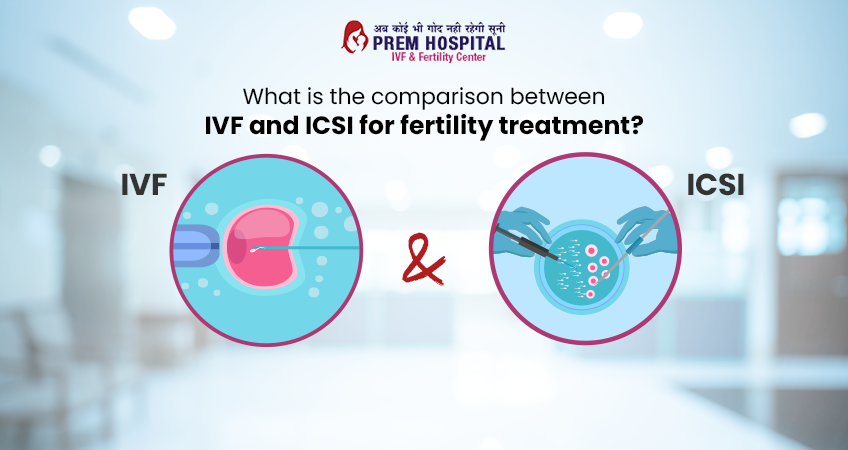Infertility has become a common issue now. Many couples find it difficult to conceive naturally, so they look for several other options. If you have come to know about your infertility, then you have probably heard the treatment options like IVF and ICSI. Do you wonder about the difference between them and which one you should choose? Today in this blog, we will discuss the same, so keep reading.
What is IVF fertility treatment?
In-vitro fertilization, or IVF, is a well-known fertility treatment that helps infertile couples to complete their families. In this treatment, a woman’s egg is retrieved and fertilized with the donor or partner’s sperm in a laboratory. Once the egg is fertilized and becomes an embryo, it is monitored for five more days before being transferred into the uterus.
Your embryologist will then transfer the well-matured and developed embryo into the uterus to sustain a pregnancy. In case of more than one embryo, couples can decide to freeze the remaining ones for future treatment. IVF is usually recommended in case of:
- Blocked or damaged fallopian tube
- Older age
- Unexplained fertility
- Difficulty in ovulation
- Low ovarian reserve
What is ICSI?
Intracytoplasmic Sperm Injection (ICSI) is a fertility treatment that can be combined with IVF. In this process, one sperm is picked, directed, and inserted into the egg for fertilization. It is a less complicated procedure and enhances the chance of egg fertilization. ICSI is more common for male infertility and can be used in conditions like:
- Low sperm count
- Abnormality in sperm
- Reduced sperm mobility.
However, ICSI is also recommended in case of frozen sperm or egg. You can also go for it if your previous IVF cycle is unsuccessful. The embryo development stage in ICSI remains the same as that of IVF.
How is IVF different from ICSI?
Both procedures are similar whether you go for IVF treatment for pregnancy or ICSI. The main difference lies in the process of how sperm fertilizes the egg. In IVF, thousands of sperm will be mingled with eggs and are left overnight for fertilization. However, in ICSI, your healthcare specialist will pick a single sperm for each egg under a microscope. In both treatments, the sperm sample will be cleaned and washed before fertilization.
Your embryologist will watch the sperm in the incubator for five days, and the best embryo will be transferred to the uterus. It is the same procedure as IVF.
Which one is better, IVF or ICSI?
ICSI fertility treatment is usually recommended when you are struggling with sperm-related infertility. ICSI usually opts for in case of male infertility, and in this procedure, extra assistance is given for sperm. IVF is recommended for various reasons and is usually preferred by women under 37 years of age who have good ovarian reserve.
Most of the time, IVF is performed with ICSI for a successful pregnancy, and the cost of both treatments varies based on the number of cycles. On average, the IVF cost in Meerut, India, is around INR 150,000 to INR 500,000 per cycle, and the same is the ICSI fertility treatment cost. However, other medical expenses like medicines, diagnostics, and consultation fees are not included in this.
The success rate of IVF and ICSI
Various factors determine the success rate of both treatments. Let’s discuss them.
Age factor: This is an essential factor. An increase in age decreases the chances of successful fertilization; with age, both the quality and quantity of sperm and egg decrease.
Your fertility problem: For some problems like a blocked fallopian tube, IVF has good success rate, while for sperm-related issues ICSI is more successful.
Previous miscarriage history: The success rate depends on the number of miscarriages you had earlier.
Dual infertility: If you and your partner both face infertility issues, the success rate will decrease.
Alcohol and smoking: Too much smoking or intake of alcohol impacts sperm mobility and sperm count. It may result in abnormal sperm behavior and thus lower the implantation rate.
Underweight or obesity: Both obesity and underweight will hurt the success rate.
Drugs intake: You may experience unsuccessful IVF or ICSI cycles if you take drugs like marijuana.
Conclusion
You must look for the best fertility hospital to increase your possibility of a successful pregnancy. Your doctor will suggest a better fertility treatment option at the first visit. Based on your health, he may suggest IVF, ICSI, or even a combination of both. Nowadays infertility has increased and many infertile couples are now opting for such treatments to get a healthy baby.
There is no risk of any type of abnormalities in babies born with IVF or ICSI. They will have the same health as the babies born naturally.

